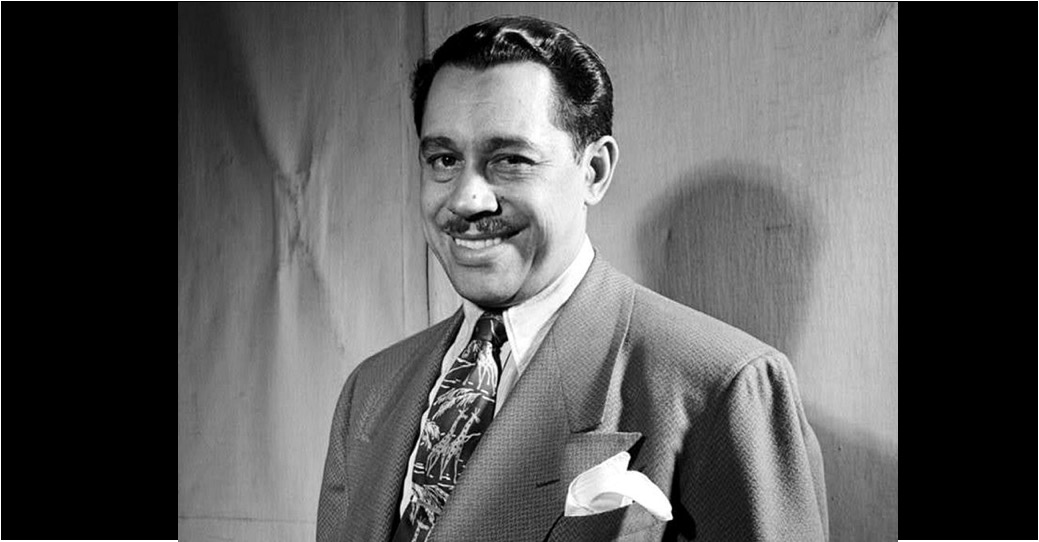On this day in comedy on December 25, 1907, Musician, Bandleader, Singer, Songwriter, Cabell “Cab” Calloway III was born in Rochester, New York
In a career that spanned eight decades, the innovative Cab Calloway was a pioneer in comedy recordings. In his era of post-minstrel acceptance, comedy was reflected in music with the lyrics as the set ups and punchlines. Bandleaders like Calloway, Louis Jordan and Fat Waller blended musical virtuosity with humorous themes. These recordings and filmed musical shorts were the precursors to “party records”; those XXX-rated albums sold in brown paper bags from under the record store clerk’s counter. The songs of Calloway were tamer than the verbal assaults of Redd Foxx, Lawanda Page, Rudy Ray Moore and others, but no less vital to the genre. With tunes like “The Skunk Song” (referencing to a man’s offensive odor) Calloway’s orchestra was able to show off their musicianship as well as their sense of humor.
Calloway began formal vocal lessons at age 15. He was good, but despite his parents and teachers guiding him towards a career in law (like his father), Calloway wanted to sing and perform jazz. The family had relocated to Baltimore and there he met influential jazz artists as he hung out in the local spots trying to pick up pointers. Once he graduated high school he joined his sister, Blanche (an accomplished musician and bandleader well before Cab and his inspiration to pursue show business) touring in the black musical revue, Plantation Days. Afterwards he went to Chicago where he gained attention as a drummer, singer and club MC. It was during this time he met Louis Armstrong who taught Calloway how to scat; which became an integral part of his act and persona.
The big thing in the 1930s and ‘40s were big bands and Calloway got him one. He took over a strong, but unsung group, The Missourians and got them a booking substituting for Duke Ellington’s Orchestra at the Cotton Club in Harlem when Ellington toured. Calloway’s new group (now called Cab Calloway & his Orchestra) was so well received that when Ellington returned Calloway’s band stayed on as the co-house group. As his popularity grew, Calloway was regularly featured on live radio broadcasts and was caricatured in cartoons (Betty Boop, Porky Pig).
Calloway reconfigured boundaries. With his hit, Minnie the Moocher, Calloway became known as “The Hi De Ho Man”. He performed flashy dance moves (including a gliding back step called The Buzz then, but later known as The Moonwalk) and sang about the joys of smoking weed (His song, Reefer Man). He did some duets with Al Jolson in the movie The Singing Kid and blew Jolson off the screen. He was a judge for WWE Wrestle Mania 2. He penned the book, Cab Calloway’s The Hepsters Dictionary: Language of Jive, wrote the column “Coastin with Cab” for Song Hits Magazine and had his autobiography, Of Minnie the Moocher and Me published in 1976. Calloway starred in all-black race films, Hollywood mainstream movies, commercials and appeared on Sesame Street. He popularized Zoot Suits and even after his band broke up in the late 40s, Calloway remained active in stage and screen projects; most notably 1980s The Blues Brothers (capturing a new generation and causing career resurgence) until his death on November 18, 1994 five months after suffering a severe stroke.
Cab Calloway received the national Medal of the Arts and was presented the honorary degree of Doctor of Fine Arts. He posthumously was honored with a Grammy Lifetime Achievement Award in 2008 after he was awarded the Grammy Hall of Fame Award in 1999.
By Darryl “D’Militant” Littleton
Check out this clip:


